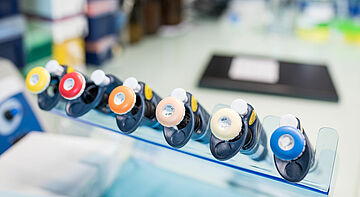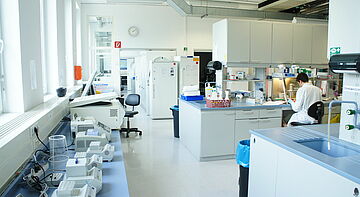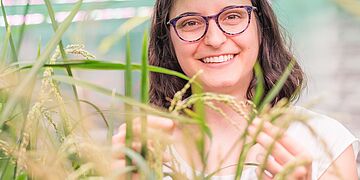An open-source COVID-19 test empowers African diagnostics and research

Many societies around the world hit an insurmountable wall when trying to access reliable disease diagnostics facilities. Too far, too expensive, or simply absent. The COVID-19 pandemic has exacerbated such inequalities, laying bare some of the challenges that low- and middle-income countries face on a daily basis. The issue takes continental proportions in Africa, where SARS-CoV-2 tests are still hard to come by and only a low percentage of the population are fully vaccinated at this point.
Laboratories in Africa often depend on test kits or reagents from Europe or North America. Shipping reagents incurs high costs, and delivery suffers long delays, which makes it very challenging for African biomedical laboratories to conduct diagnostics. Scientists and organizations around the world have recognized this issue – they have started to work to counter it and to build scientific capacities in Africa.
Like many stories of successful scientific collaborations, this one started from casual conversations between two researchers at an international meeting. In February 2020, New York University Abu Dhabi was hosting the Annual Conference on Genomics and Systems Biology, which brings together life scientists from around the globe. Although the international meeting was taking place as planned, tension filled the air. COVID-19 was claiming more and more lives around the world and scientists could sense the looming threat of a global crisis.
When Andrea (Andi) Pauli, group leader at the Research Institute of Molecular Pathology (IMP) in Vienna, Austria, attended the conference and met Lucia Prieto-Godino, group leader at the Francis Crick Institute in London, UK, she did not imagine it would result in an international collaboration connected to the COVID-19 pandemic and to diagnostics in Africa.
After the conference, Pauli came back to Vienna and she was met with a difficult reality: from 16 March, most staff at the IMP and other research institutes at the Vienna BioCenter were sent home: lab work was cut to a minimum due to a first lockdown. While most researchers paced their living rooms for a solid month of home office, a handful of scientists across the Vienna BioCenter campus decided to take action and bring their contribution to the fight against the pandemic. Vaccines were already in preparation, but it was clear that they would not reach all populations in need for months or years to come. It was crucial to develop efficient testing methods that could be deployed at a broad scale, and at a lower cost than PCR tests: the RT-LAMP project was created to tackle this issue.
Reverse transcription loop-mediated isothermal amplification (or RT-LAMP) is a molecular assay that helps detect nucleic acids (RNA or DNA) in a sample. The method is relatively simple. Starting with a five-minute lysis step that breaks open cells and virus particles, RT-LAMP employs an enzymatic reaction in which the viral RNA is converted into DNA and amplified billionfold within less than 30 minutes. The generation of such tremendous amounts of DNA is made visible for the naked eye through a dye that changes from purple to sky-blue in the reaction tube. Neither specialized laboratory equipment nor expert skills are needed – the most challenging step is to keep the sample at a stable temperature of 63 degrees during the 30 minutes of the reaction, a task that can be fulfilled by repurposed kitchen devices.
This protocol is cheap, simple, and quick, which in principle makes it an ideal candidate for SARS-CoV-2 testing. However, limited sensitivity and robustness had held back RT-LAMP-based assays from entering the center stage for SARS-CoV-2 diagnostics.
Together with Julius Brennecke, senior scientist at the neighboring Institute of Molecular Biotechnology (IMBA) of the Austrian Academy of Sciences, Andi Pauli gathered a team of researchers and students across institutions at the Vienna BioCenter to push the established protocol to a new level. Max Kellner, now a PhD student at IMBA, Martin Matl, an undergraduate student from Masaryk University, Czech Republic, Jakob Schnabl, a former PhD student in Brennecke’s Lab, and Julian Ross, another PhD student at IMBA, optimized the original method to make it more robust, more sensitive, and even easier to use. They combined the original method with a simple RNA enrichment step, which boosts sensitivity by orders of magnitude.The improvements they made have turned RT-LAMP into a potential game-changer for population-scale screening, especially in disadvantaged countries where routine PCR tests are not an option. The method is now published in the journal Frontiers in Molecular Biosciences.
“Improving the RT-LAMP protocol to create a simple test for SARS-CoV-2 was a major achievement that our team can be very proud of,” says Pauli. “The next logical step was to make this protocol open-source, so that it could reach the people who need it most.”
Max Kellner, who joined the team after being stranded in his hometown during the first lockdown, was instrumental in the beginnings of the RT-LAMP project. His expertise in molecular diagnostics, which he gained during his master in the lab of Feng Zhang at MIT, accelerated the development and implementation of the first RT-LAMP assay. “It was clear that we needed a rapid and scalable test that works independently of expensive machines and that can be deployed to resource-limited settings. RT-LAMP quickly turned out to be the most robust technique,” he says. Together with Martin Matl, he then went on to simplify the assay step-wise and replace commercial enzymes with home-made alternatives. Martin Matl worked restlessly for a year to make the RT-LAMP protocol open and to get the assay established in African labs.
“Certain parts of the world have limited access to molecular biology protocols because they have to order enzymes and other reagents from abroad, which can take months and costs a ridiculous amount of money,” explains Matl. “Making the RT-LAMP protocol open-source was about empowering smaller labs around the world to synthesize their own reagents, and thereby solve the supply chain issues that they face.”
It was one thing to create an open-source protocol for SARS-CoV-2 testing, but the crucial step was to find international partners that could use and spread the method to countries in need. That is where Andi Pauli and Lucia Prieto-Godino’s fortuitous encounter came in handy.
Andi Pauli’s lab investigates the molecular mechanisms that drive fertilization in zebrafish, while Lucia Prieto-Godino’s group researches the evolution of neural circuits in fruit flies. In other words, neither had expertise in infectious disease diagnostics before this project started. What they did have, however, were the lab resources and the international network to build a project that would benefit disadvantaged populations.
Lucia Prieto-Godino founded and runs TReND in Africa (Teaching and Research in Natural Sciences for Development in Africa), an organization that promotes science and education on the African continent. Since its foundation in 2011, TReND has been working to develop research capacity and open hardware with a wide array of collaborators in Africa through various courses, a volunteering programme, and an online collaboration programme.
“I have been in touch with Andi, Julius, and their team soon after my return to the UK from Abu Dhabi. Designing an open-source COVID test that could be used in small labs in Africa was a perfect project for TReND, so I contacted my network within the organization. I teamed up with Jochen Wittbrodt from the University of Heidelberg and started working on a grant application with the Volkswagen Foundation,” recalls Lucia Prieto-Godino.
Thomas Auer, group leader at the University of Lausanne, Switzerland, and volunteer at TReND, and Jenny Molloy, founder and director of the Open Bioeconomy Lab and Shuttleworth Foundation research fellow at the University of Cambridge, UK, were instrumental contributors to the venture. Thomas Auer has been organising genome editing courses with TReND and he knows the workings of grant applications for such projects. Jenny Molloy has known the work of TReND for years – she is an expert in the field of open molecular biology and has established a global network of life scientists.
“Having Thomas and Jenny on board has been crucial to receive funding and to reach out to our African collaborators,” says Prieto-Godino. “The Volkswagen Foundation had already granted us funding for genome editing courses, and they generously topped that with independent funds through their COVID-19 programme, because they liked our idea.”
The RT-LAMP project in Africa involves four African institutions: MboaLab, the Centre for Research in Infectious Diseases (CRID), and the Military Health Research Centre (CRESAR) in Yaoundé, Cameroon, and the West African Centre for Cell Biology and Infectious Pathogens (WACCBIP) in Accra, Ghana.
MboaLab was the first institution in Cameroon to join the initiative. Founded in 2017, MboaLab catalyzes research to improve the living conditions of the Cameroonian people through open science. Their staff work to manufacture and distribute enzymes and other reagents to Central African researchers.
“Our mission is to provide tailor-made solutions to the people who need it. Open-science is a game-changer in that regard,” says Stephane Fadanka, Executive Director of MboaLab. “Thanks to our long-lasting collaboration with Jenny Molloy and the Open Bioeconomy Lab, we’ve made strides in enzyme manufacturing and we were quick to join the RT-LAMP project.”
Scientists at MboaLab have worked closely with the team at the Vienna BioCenter to validate the open-source RT-LAMP protocol. Last year, they have received a first batch of kits that they tested on site.
“Before we can implement RT-LAMP for diagnostics and research purposes, we will have to improve our purification steps,” explains Fadanka. “After that, we’ll be able to accelerate production and distribute our products within Cameroon and beyond.”
The team sees RT-LAMP as an opportunity to expand MboaLab’s expertise. “We’ve moved towards quality-assured production for research, but what we’re still exploring is how to manufacture diagnostics locally, because a lot of the detailed knowledge is tied up in companies and proprietary know-how,” explains Jenny Molloy. “It’s difficult and expensive to manufacture reagents to a high-quality standard, and I hope this project kickstarts that process for our partners.”
CRESAR was next to join the list of collaborators. A student from MboaLab interning at CRESAR approached Colonel Dr Julius Nwobegahay, Head of CRESAR, to extend the collaboration and participate in the project. Dr Nwobegahay was immediately enthused and worked closely with his research assistants and students, Cyntia Nguepnang Chimi, Master’s student in Microbiology, Tatiana Noumi, Microbiologist, and Denise Soh, Master’s student in Microbiology, to contribute to the RT-LAMP initiative.
“Since the pandemic started, we have been at the forefront of COVID-19 testing within the military and beyond,” explains Nwobegahay. “Since its foundation in 2000, CRESAR has been a leader in virology in Cameroon. We do research and diagnostics with viral diseases such as HIV/AIDS, hepatitis, and ebola, so we brought in that expertise to the RT-LAMP project.”
MboaLab and CRESAR are working hand in hand with the help of Martin Matl to validate the open RT-LAMP protocol, and compare the results of their RT-LAMP tests with real-time PCR tests. “RT-LAMP doesn’t require any sophisticated equipment - scientists at MboaLab don’t have the resources that we have, but they make it work. We are very happy with this collaboration, as well as with CRID,” says Dr Nwobegahay.
CRID’s joining of the initiative was led by Charles Wondji, CRID Executive Director, Professor of Genetics at the Liverpool School of Tropical Medicine, and Wellcome Trust Senior Research Fellow in Biomedical Sciences. He works with a team of scientists to push the project forward and strengthen the ties with other African institutes.
“The impact of this initiative isn’t limited to building research capacities in Africa, it also created a network of collaborators within Africa and beyond,” says Huguette Simo, postdoc at CRID. “Before the pandemic, our interactions with other institutes in Yaoundé were rather limited - I didn’t even know about MboaLab back then, but now that we have established this connection, I see a bright future for infectious disease research in Cameroon.”
In Cameroon and many other African countries, obtaining reagents for basic molecular biology methods is an ordeal. “Half of the price we pay for reagents goes to shipping and customs clearance, which becomes extremely expensive,” says Simo. “On top of that, an order can take six months to arrive, and may be damaged if the cold chain is broken. Once MboaLab has validated their enzyme production, we will no longer depend on imported commercial kits for diagnostics and research.”
Hopes for more research independence are just as high at WACCBIP in Accra, Ghana. Since its establishment in 2013, WACCBIP has grown into a leading centre of excellence, building global partnerships with world-class research institutions and funding organisations. The center seeks to improve the diagnosis, prevention, and control of tropical diseases in sub-Saharan Africa by providing advanced-level training and leading excellent research in cell and molecular biology. Researchers at WACCBIP face similar challenges to those of their Cameroonian colleagues: importing reagents takes too much time and money, even more so because of the COVID-19 pandemic.
When Felix Ansah, a PhD student in the Awandare Research Group at WACCBIP, heard that he would be involved in developing a quick and affordable assay to detect SARS-CoV-2, he was filled with enthusiasm. “As part of my PhD project, I have produced different polymerases for malaria diagnosis,” he explains. “I was glad to put my expertise to good use for the RT-LAMP project and to help create an affordable solution to COVID-19 testing.”
For Ansah as much as for the other African partners, it is clear: the RT-LAMP initiative has brought the importance of collaborations forward. “We network, share ideas and tips to improve our protocols - it’s a very fruitful exchange that we want to extend beyond the pandemic. Setting up manufacturing centres in Africa like WACCBIP and MboaLab will be a game changer for African research.”
“This project’s reach goes beyond the current pandemic. It brings another piece of evidence to show that we don’t need to import reagents to conduct our research. MboaLab and WACCBIP could produce enzymes and other reagents and distribute them to African labs,” adds Dr Nwobegahay.
Creating a series of manufacturing nodes that produce reagents in Africa for Africa would allow research funding allocated to African institutions to enrich the local economy, rather than to leave the continent.
“Many of my collaborators in Africa depend on intercontinental collaborators to move their research forward. Ideally, these collaborations wouldn’t be a necessity, but a bonus, or an enhancer for research,” says Jenny Molloy. “Ironically, I want to get to a point where I and my present work are no longer needed.”
The health crisis of the past two years launched the RT-LAMP project, and the team hopes it will only be the starting point of a greater change. The technology developed for RT-LAMP can be used to detect other infectious diseases with minimal equipment - an important feature for Africa, where many neglected diseases do not draw enough attention from funding bodies in high-income countries. In addition, open-source RT-LAMP contributes to building the foundation for innovation and reagent manufacturing in Cameroon and Ghana, giving these countries the power to conduct independent biomedical research.
“A host of drugs and vaccines have been developed and deployed since the World Health Organisation declared COVID-19 a global pandemic on 11 March 2020,” says Julius Brennecke. “The past two years have demonstrated how fast the international scientific community can work when they’re given the right resources. We need to be more inclusive of Africa in such efforts.”
“The only sustainable, effective way to tackle epidemics in the long-term is to decentralize the innovation and manufacturing capabilities of scientists, so that we have a more diverse network of research hubs that can bring their stone to the building,” concludes Lucia Pietro-Godino.
---
Further reading
RT-LAMP, a simple detection strategy
Open RT-LAMP project: more information
World Health Organization initiatives to tackle access to COVID-19 health products: Access to COVID-19 Tools and COVID-19 Technology Access Pool
News & Updates on SARS-CoV-2 Research at the Vienna BioCenter






